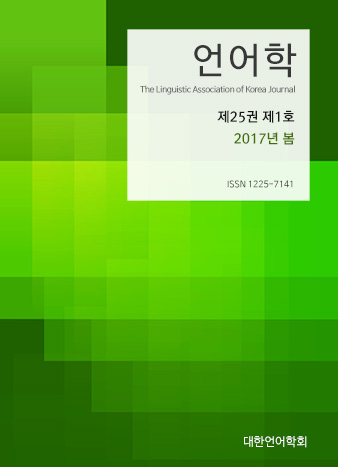대한언어학회 전자저널

-
Why is the Locative NP in Kiswahili not Syntactically Oblique?
-
Developmental Errors in Chinese L1 Speakers’ Use of the L2 English Past Tense and Perfective Aspect
-
An Exploration of High School Reading Test Items Based on Discriminant Analysis
-
Marketization of University Brochures in Korea and the US: From a Genre Analysis Perspective
25권 1호 (2017년 3월)
- Why is the Locative NP in Kiswahili not Syntactically Oblique?
-
Assibi A. Amidu
Pages : 1-27
Abstract
Keywords
# noun # NP # preposition # PP # locative # oblique
References
- Amidu, A. A. (1980). Locative marking and locative choice in Swahili and their semantic and grammatical implications. Unpublished doctoral thesis. SOAS, London: University of London.
- Amidu, A. A. (2002). The paradox of number and non-number in Kiswahili classes. Linguistic Association of Korea Journal, 10(4), 149-178.
- Amidu, A. A. (2007). Why locative marking in Kiswahili Bantu is not that simple. Linguistic Association of Korea Journal, 15(3), 21-42.
- Amidu, A. A. (2012). PP arguments in Kiswahili Bantu and their implications for transitivity theory. Linguistic Association of Korea Journal, 20(1), 1-30.
- Amidu, A. A. (2013). Objects and complements in Kiswahili classes. A study of their mechanisms and patterns. Köln: Rüdiger Köppe Verlag.
- Amidu, A. A. (2014). A study of non-colonial prepositions in Kiswahili. Linguistic Association of Korea Journal, 22(2), 27-59.
- Amidu, A. A. (2015). Remarks on agreements in Kiswahili possessive NPs. Linguistic Association of Korea Journal, 23(4), 1-25.
- Ashton, E. O. (1947). Swahili grammar, including intonation (2nd ed.). London: Longman Group Ltd.
- Bresnan, J. (1994). Locative inversion and the architecture of universal grammar. Language, 79(1), 72-131.
- Bresnan, J., & Kanerva, J. M. (1989). Locative inversion in Chichewa: a case study of factorization in grammar. Linguistic Inquiry, 29, 1-50.
- Chomsky, N. (1995). The minimalist program. Cambridge, Mass.: MIT Press.
- Crystal, D. (2003). A dictionary of linguistics and phonetics (5th ed.). Oxford: Blackwell Publishers Ltd.
- Jin, M-H. (2015). Locative inversion in Mandarin Chinese. Linguistic Association of Korea Journal, 23(4), 27-43.
- Kanerva, J. M. (1990). Focus and phrasing in Chichewa phonology. New York: Garland.
- Katamba, F. (1993). Morphology. London: Macmillan Press Ltd.
- Keenan, E. L. (1985). Passives in the world's languages. In T. Shopen (Ed.), Language and typology and syntactic description, vol. I (pp. 243-281). Cambridge: Cambridge University Press.
- Kim, J.-M. (2007). EPP and case in locative inversion. Linguistic Association of Korea Journal, 15(3), 239-256.
- Landau, I. (2010). The locative syntax of experiencers. Cambridge, Mass.: MIT Press.
- Levin, B. (1993). English verb classes and alternations. A preliminary investigation. Chicago and London: The University of Chicago Press.
- Lyons, J. (1968). An introduction to theoretical linguistics. Cambridge: Cambridge University Press.
- Matthews, P. H. (2007). Oxford concise dictionary of linguistics (2nd ed.). Oxford: Oxford University Press.
- Quine, W. V. O., & Ullian, J. S. (1978). The web of belief. New York: Random House Inc.
- Robert, S. (1966). Kusadikika. Nairobi: Thomas Nelson and Sons Ltd.
- Sacleux, C. (1909). Grammaire des dialects Swahilis. Paris: Procure des PP. du Saint-Esprit.
- Smith, N., & Wilson, D. (1979). Modern linguistics. The results of Chomsky's revolution. Harmondsworth, Middlesex: Penguin Books Ltd.
- Steere, E. (1870). A handbook of the Swahili language as spoken in Zanzibar. London: Bell and Dalby.
- Whiteley, W. H. (1968). Some problems of transitivity in Swahili. London: School of Oreitnal and African Studies, University of London.